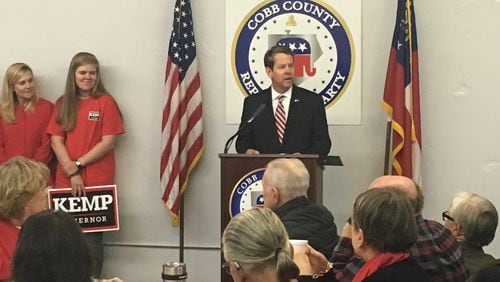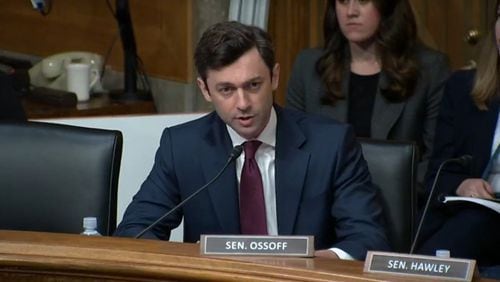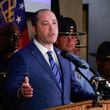Secretary of State Brian Kemp opened his campaign for governor Saturday by borrowing themes from Donald Trump, pledging a “Georgia first” strategy that would crack down on illegal immigration, as he took aim at establishment forces and the media.
The Athens Republican pledged to impose an adjustable spending cap on Georgia's growing state budget and return leftover money to taxpayers. And Kemp, a veteran of state GOP politics, drew applause from hundreds at a Cobb GOP breakfast with broadsides against "fake news" and the well-connected political status quo.
He promised his administration would "treat rural Georgia the same way we treat metro Atlanta" and emphasized his background as the owner of stone and construction firms – jobs he continues to hold while working in his $130,000-a-year state post.
“It helped that unlike many, I never, ever became a full-time politician,” said Kemp, a former state senator who was first appointed to the Secretary of State’s job by Gov. Sonny Perdue in 2010.
Kemp is the first high-profile Republican to formally join a wide-open race to succeed Gov. Nathan Deal, and he said he would build on the governor's pledge to make the state the top place to do business.
The race remains very fluid. Republican Lt. Gov. Casey Cagle is all but guaranteed to join the race and several other GOP candidates are openly considering a bid. That list includes former U.S. Reps. Jack Kingston and Lynn Westmoreland, Georgia House Speaker David Ralston and state Sens. Michael Williams, Hunter Hill and Josh McKoon.
The other side of the ticket is just as uncertain, though. Democrats hope Trump's election can help them retake the post for the first time since 2002. Georgia House Minority Leader Stacey Abrams is seen as a virtual lock to join the race. And former state Sen. Jason Carter, state Rep. Stacey Evans and one-time acting U.S. Attorney General Sally Yates could also run.
Kemp was appointed by Perdue as the state’s top elections official after Karen Handel resigned to run for governor, and he won his first of two four-year terms later that year.
The 53-year-old has long been considered a potential gubernatorial candidate and he has tried to raise his profile by calling on Trump to investigate the Obama administration's apparent attempt to access his office's computer system. He's also attracted national attention railing against left-leaning groups that accused his office of voter suppression.
But a pair of elections-related disclosures will likely be fodder for his opponents.
In 2015, his office accidentally sent confidential voter data to political parties and media outlets. Kemp's office issued a report putting the blame on a staffer fired shortly after the breach.
And in March the FBI launched an inquiry into a suspected cyberattack after state officials received notice that records kept by the Center for Election Systems at Kennesaw State University may have been compromised. Federal investigators said Friday a "security researcher" was behind the breach and that no federal laws were broken.
Kemp jumped into the race early in part because he needs to start raising significant cash – and soon. While he owns stakes in stone supply and construction businesses and has at least $3 million in land holdings, he doesn’t have the immense wealth needed to finance his own campaign.
The secretary of state has long been a launching pad for attempts at higher office. Kemp’s last three predecessors – Lewis Massey, Cathy Cox and Handel – all ran for governor. It’s also an imperfect launching pad: All three of those candidates lost. The office-holder before that, Max Cleland, served a term in the U.S. Senate.
Kemp’s political rise began with an upset victory. He ousted a liberal Democratic incumbent to win his Athens-based seat in 2002, part of a wave of Republican victories that tipped the balance of power in the statehouse toward the GOP. He held the seat two years later in a tough re-election fight.
Itching for statewide office, Kemp launched an unsuccessful bid for agriculture commissioner in 2006, and then returned to the private sector. When Handel stepped down in 2009, Kemp announced a run for her old gig before getting appointed by Perdue. That gave him a big leg up when he ran for a full term in 2010.
In an interview after his remarks, Kemp said he won’t resign to run for governor. That means he will have a statewide platform through November 2018, but it also will deny him about three months of fundraising during next year’s legislative session.
His speech Saturday highlighted Trump-ian themes throughout, including tough talk about crackdowns on illegal immigrants and the need to boost rural Georgia's economy. It was a reflection of rural Georgia's importance in the Trump era: The president lost Cobb and the rest of core metro Atlanta, but still won the state thanks to huge margins in rural Georgia.
“This is Georgia,” he said, echoing another Trump mantra. “We will be putting Georgia first.”
About the Author








